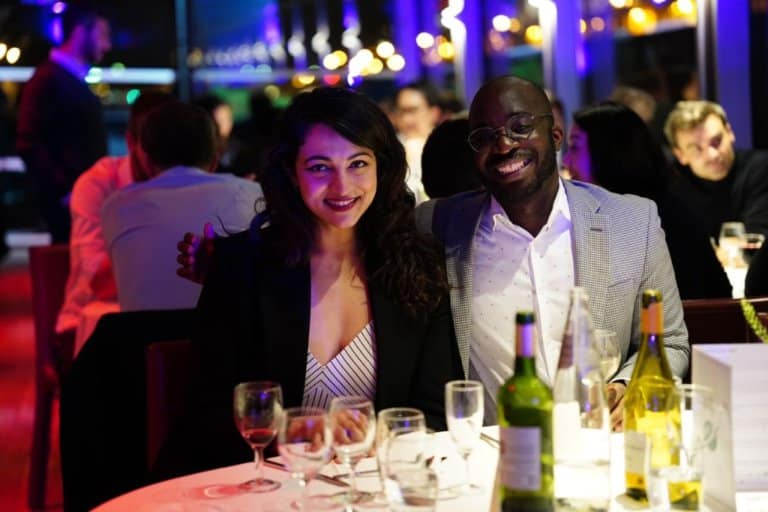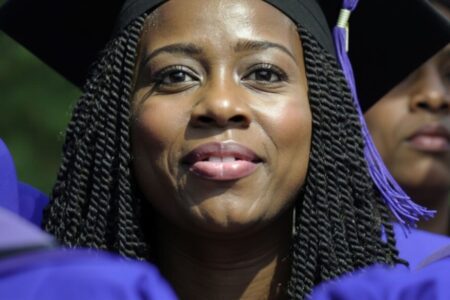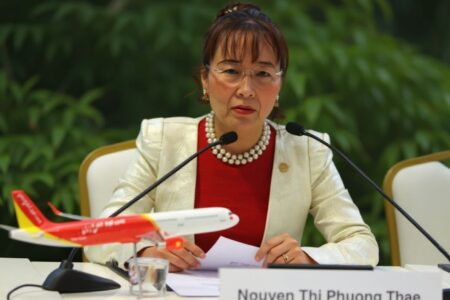
Apeksha Gupta, 32, will soon earn her third degree. Given all she’s achieved, it’s one that many would see as unnecessary.
As one of India’s most successful women entrepreneurs, Gupta has climbed all the way to the top, becoming CEO of global eyewear brand John Jacobs.
She won the no. 1 job — then, she went back to school.
“I had harboured a clear ambition to lead John Jacobs as its CEO. The business had scaled rapidly over three years and we had grown to dominate the revenue share within the parent organisation (that was now a global player with significant standing in the eyewear market), and the timing was perfect to spin off John Jacobs as a separate subsidiary,” she says.
“I believed I was the right person to lead the business and in 2020 had communicated the same with management. There was resistance, with my relative inexperience and an absence of an MBA being cited as deterrents.”
Despite having two degrees and nearly a decade of experience working with fashion brands, Gupta was then still seen as a not-good-enough candidate.
She started her career back in 2014 as a fashion buyer for the India subsidiary of the denim brand, Diesel S.p.A — gaining experience in brand management and operations.
Promotions followed, such as becoming — at 23 years old — the youngest fashion buyer at Milan Fashion Week, making pivotal commercial decisions for the Indian market.
This was followed by a role as Business Unit Head (Kidswear) for Marks & Spencer India. “A significant promotion,” it entailed turning around a struggling business with waning market share.
“The endeavour demanded an overhaul of the supply chain, a strategic repricing, and meticulous attention to the bottom line,” she says.

Apeksha with Global Executive MBA (GEMBA) classmates at INSEAD Asia Campus in Singapore. Source: Apeksha Gupta
In 2018, Gupta joined Lenskart, then a young eyewear start-up before it was valued at US$2.5 billion (and amongst Asia’s largest eyewear companies) a few years later.
“I was invited to bring my experiences in premium fashion brands to help the company build a distinguished D2C eyewear brand,” she says.
By 2020, Gupta believed she was ready to become John Jacobs’s CEO.
The board didn’t — until they saw her admittance letter to INSEAD’s Global Executive MBA (GEMBA) programme.
Having “one of the most powerful brand names in the business school world” changed the course of her career.
“I was promoted to CEO of John Jacobs, the organisation restructured to spin off the business as a subsidiary and was supportive to provide the resources to help me go to my dream school and complete the programme,” she says.
“I hence joined the GEMBA, Class of 2024.”
 While the number of female CEOs employed at the US’s 500 highest-grossing companies is rising, only 15% of the top jobs are held by women.
While the number of female CEOs employed at the US’s 500 highest-grossing companies is rising, only 15% of the top jobs are held by women.
Women business leaders are few; women entrepreneurs are rarer still
Despite making up nearly 51% of the population and despite research showing companies with women in management tend to achieve better outcomes, only 7.4% of Fortune 500 CEOs and 27% of Fortune 500 board members are women.
A 2022 McKinsey and LeanIn.org joint report found only one in four C-suite leaders is a woman, and only one in 20 is a woman of colour.
In the US, only 36% of companies in the US are owned by women. Globally, women entrepreneurs get only a fraction of venture capital; and those who are Black, Hispanic or Asian get significantly less.
Fewer than 10% of start-ups are owned by women, according to researchers at Harvard.
While part of this is due to girls not seeing themselves as women entrepreneurs, a lot of it has to do with how investors — mostly men, mostly white — tend to mentor and invest in people who look like them. Women tend to do what they see people like themselves doing.
The lower number of women entrepreneurs is found to be “highly correlated to women’s lower average levels of optimism and self-confidence, and higher fear of failure.”
The same research found that women “who are more self-confident and undeterred by failure” are likelier to start a business than men with similar characteristics.
Gupta is finding that extra confidence by going to business school.
“The school’s formidable reputation is well-known across industries that are dear to me, and this credibility significantly enhances my career prospects,” she says.
“INSEAD’s strong connections with key players in these industries ensure that I am exposed to the latest trends, insights, and opportunities. This alignment with my professional goals is a crucial factor that sets INSEAD apart, giving me the confidence that I am investing my time and efforts in a programme that has a direct impact on my chosen career path.”

Elizabeth Kong (sixth from left) in the Abu Dhabi sand dunes, together with some of her classmates after completing their module in the INSEAD Middle East Campus. Source: Elizabeth Kong
‘A shot of steroid’ to become a leader today
Like Gupta’s, Elizabeth Kong’s career is just as prolific.
Despite the pepperings of biases that “ranged the whole spectrum from the subtle to the outright egregious,” she’s ascended to the top, with no shortage of well-compensated leadership roles and awards won.
Yet, Kong is joining other women entrepreneurs and business leaders who seemingly already “have it all” in getting another degree.
After receiving a scholarship from the Port Authority of Singapore (PSA) to read law at the University of Cambridge, Kong caught the attention of a premier law firm. Morgan Lewis Stamford (then known as Stamford Law) bought her out of her PSA six-year bond, so she could work for the firm instead.
Within three years, while having “the time of her life,” she made partner within three years and moved to another leading international firm, Clifford Chance.
“For a decade, I was involved in some of the largest headline transactions in the region and have experience advising on deals of an aggregate value exceeding US$25 billion,” says Kong.
“I also had the honour of being noted in Chambers Asia, Legal 500, AsiaLaw Leading Lawyers, Lawyer Monthly and Acquisition International Legal, and was the youngest to be featured in Singapore Business Review’s inaugural list of ‘20 Most Influential 40 and Under Lawyers’ and in Prestige Singapore’s list of ‘40 under 40’.”
Kong felt her learning curve and professional satisfaction plateau after this. “As a corporate lawyer, I advised clients on major milestones in the lifecycle of a corporation: from incorporation to growth to dissolution,” she says.
“But my visibility into the day-to-day of the companies stopped once my respective engagements ended. I craved to sink my teeth deeper into the nuts and bolts of business.”

Elizabeth Kong was the youngest to be featured in Singapore Business Review’s inaugural list of “20 Most Influential 40 and Under Lawyers.” Source: Elizabeth Kong
It was time to move to 3M, which is listed on the New York Stock Exchange, and has a market capitalization of US$80 billion and operations in 87 countries and approximately 80,000 employees globally.
Kong is the Asia General Counsel for Transportation and Electronics Business, a role that comes under the umbrella of the 3M Office of General Counsel.
“I serve as a senior leader in the execution of strategies and key priorities of Asia,” she says. “My leadership responsibilities extend across Asia, and I am supported by team members in each jurisdiction under my charge.”
She’s also an Independent Non-Executive Director of SingPost, a blue-chip e-commerce logistics company listed on the Singapore Exchange.
SingPost has a market capitalisation of $1.5 billion, operations in 17 markets and over 4,000 employees.
“Beyond my general board role, I also sit on the Finance and Investment Committee, Risk and Technology Committee, Nomination and Corporate Governance Committee, and the Sustainability Committee,” says Kong.
“Previously, I chaired an Independent Special Committee, whose terms of reference were to review the Group’s previous acquisitions in the US, which had to be done in view of a substantial impairment exercise.”
The gravity of her role does not escape Kong, and neither do the benefits. “While it was my legal expertise and background they were after, I got so much more in return sitting shoulder-to-shoulder with, and learning from, the most respected corporate luminaries in Singapore,” she says.
“Nevertheless, a view from the boardroom is necessarily 20,000 feet above ground, and I wanted to get even closer to where the action is.”
 An MBA lets one meet other women entrepreneurs and build their network. While Kong, now 41, knows her extensive legal experience equipped her to negotiate, close deals as well as manage teams and clients, she’s aware there is so much more for her to learn.
An MBA lets one meet other women entrepreneurs and build their network. While Kong, now 41, knows her extensive legal experience equipped her to negotiate, close deals as well as manage teams and clients, she’s aware there is so much more for her to learn.
“Experiencing business from only one perspective paints an anaemic view of its myriad of complexities,” she says.
She applied to Tsinghua-INSEAD Executive MBA to be more “T-shaped” and to learn more about all critical functions in an organisation to solve even more complex problems in general management.
“TIEMBA, with its laser-focused curriculum on core management modules that are supplemented by a range of highly relevant electives for the leader of today, is truly a shot of steroid in the arm for me to achieve that goal,” she says.
Many would feel Kong has proven herself already, with no need to get another degree. Some could even argue here’s another example of women having to outperform to get to the apex of corporate power.
But Kong believes in developing her career. There are gaps in her knowledge that Tsinghua can fill, such as their expertise in business in the China market.
With minimal disruption to her work commitments, she can apply what she learns in her highly diverse classroom to the real world. Being assigned an executive coach throughout the programme duration further facilitates self- as well as group reflection on potential areas of improvement.
“The programme far exceeds my expectations in terms of its practicality and manner of delivery, and thoroughly debunks any notion that one can obtain equivalent value from self-studying,” says Kong.
She aims to pivot from a more specialised professional value proposition to a more generalist one — a goal Kong thinks her MBA will help her achieve.
But there are more benefits to an MBA she’s set to gain.

According to the Fortune 500 list, more than 10% of Fortune 500 companies are led by women.
The Forté Foundation has examined the significant impact of earning an MBA on women’s salaries and positions within their respective industries and organisations. The key findings include:
- Women with MBAs see pay gains of 55-65% of their pre-MBA salary within five years of graduation.
- On average, companies with female board directors experience a 53% higher return on equity.
- 85% of MBA graduates attribute their MBA to advancing their careers.
A 2018 GMAC study also found that nine out of 10 women who pursued a full-time MBA felt that it was a rewarding experience and that they would make the same choice again.










